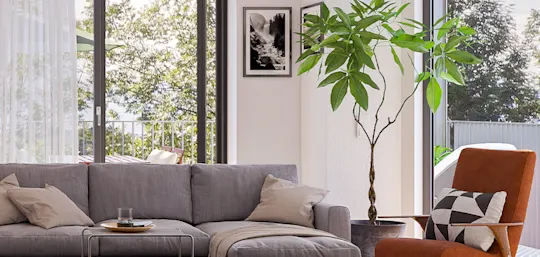What makes a good investment property?
Knowing what to consider before buying an investment property is important. Here we’ve listed some tips to help make sure your future investment is right for you.

Unlike buying a home to live in, an investment property is usually bought with the goal of making money. Investing in property is a popular way to invest money, but before starting, there are lots of things you need to consider.
Location counts
Investing in a property located in the right suburb can significantly increase your chances of success in a competitive property market. When selecting a location, consider the following factors:
Low vacancy rates and high rental yields. This indicates a popular suburb for renters where demand is greater than supply. This can help ensure a consistent rental income and potential for capital growth.
Low 'days on market' average. This gives you confidence that properties are selling quickly in your suburb, reducing the risk of long-term vacancies.
High auction clearance rates. A high percentage of listed properties that successfully sell suggests that the suburb is in demand. This can indicate potential for capital growth and a competitive market for rental properties.
Investing for future success
You want to invest in the type of property that is not only in demand now, but in the future as well.
A good way to do this is to look at past local tenancy trends. The Australian Bureau of Statistics is a good place to go for all your general stats.
Another good idea, if you're not familiar with the neighbourhood you're considering, it's to seek advice from someone who is. That way, you can ensure that your property will meet future demand and thus increase your chances of achieving long-term success.
Proximity to the CBD or area of industry
Generally, the closer to the CBD the better, as it's common for renters to want to be closer to the city, especially if they're working there or nearby (and these properties are generally out of range for purchasing to live in). Living close to the city or an area experiencing growth (economic or industrial), is very desirable to a lot of tenants and potential buyers.
Transport
Regardless of the location, it's important that your tenants are able to get around quickly and easily. Check out your property's walk score at www.walkscore.com and get a commute report to see options for getting around by car, bike, foot and public transport. This way, you can make sure there are plenty of options to satisfy your tenant or future buyer.
Walkability
Just like general transportation, it's a good idea to make sure your investment property has strong connections to a village or shopping precinct. Tenants want to be able to walk down the road for a coffee, take their dog to a local park, or make a quick visit to the shops.
You want your investment property to be in close proximity to:
Cafés
Restaurants
Grocery stores and shopping centres
Schools and kindergartens - for growing families (school zoning is important to consider)
Universities (if it fits with your target demographic)
Environment (parks, beaches and rivers)
Community facilities (gyms, local pools, cinemas, town hall and function centres)
Community events (local markets)
Demographic
A suburb’s ‘vibe’ can heavily influence the kind of demographic your property appeals to. So make sure not only the dwelling type, but also the suburb, will satisfy your target demographic’s needs. For example, you won’t have much success attracting Uni students to your investment property if you’re miles away from the university with no way of getting there.
Median price range
The amount you’re happy to pay for your investment property is unique to you and varies significantly from person to person. However, it is recommended that you consider something close to your chosen location’s median price range. Knowing the ‘going’ rate of similar properties in your chosen area will give you a better understanding of how much you’ll be able to charge for rent and help you make a more cost-effective decision.
For example:
One home for $500,000 could charge $400 a week rent, but a $750,000 property in the same location may only be able to earn $500 in weekly rent. Will the extra $250,000 outlay be worth reducing your yield on the property?
House vs apartment
When it comes to buying an investment apartment versus buying a house, there’s no clear answer as to which is better. It’s good to keep in mind though, that apartments can come with their own baggage. Unit blocks with additional facilities such as pools and elevators, while appealing, will usually result in higher strata levies (code name for ‘fees’). As with any good investment, you want to incur minimal costs so you’re not eating into your profits.
If you do want to invest in an apartment, it’s a good idea to look for complexes with a mix of owner-occupiers and tenants in the building. You don’t want to buy into a building where all the owners are absent landlords who don’t put as much love and care into the upkeep of the building as an owner who is living in the building would.
New vs existing
Some investors prefer to buy brand new, so minimal (or no) renovation work is required. However, don’t discount a period property. Surprisingly high in demand due to their rarity, period properties can be a great investment - just make sure you get a building inspection.
Keep in mind that roughly 60-70% of the value of an investment property is in the land, but with newer apartments, the value comes from the newness of the apartment (which will depreciate over time). You might be better off buying an older Art Deco apartment than a new, shiny apartment in a big complex.
Positive capital growth
Get your hands on property reports to show the property’s past capital growth so you can compare and evaluate – you want your property to have high capital growth.
Ask yourself, does your property have room for improvement? Consider whether you can add on another bedroom, do up the kitchen, or add a fresh coat of paint for some potential monetary benefits - just make sure you stick to your budget.
Liveability
Whilst you won’t be living there, you still need to make sure your property is appealing and livable (at least in the eyes of your target market). Be careful not to get emotionally attached, the tenant should constantly be at the forefront of your mind.
You want your property to have:
A functional floor plan that flows in alignment to your target individual’s needs.
Maximal natural lighting and the correct aspect to achieve this at all times of the day.
Appropriate parking.
A moderate to low maintenance schedule.
A welcoming façade and first impression. Make sure you’re not the best house on the worst street – people care a lot about their neighbours.
So, now that you have a long list of things to consider when purchasing an investment property, you’re almost ready to invest like a pro. Follow our tips and have confidence that you won’t forget any critical keys to success. It’s always a good idea to speak to a financial advisor before making any major financial decisions. Once you’ve found your property, you can find out what’s next by reading our home loan guide ‘You’ve found your dream home, now what’.
You have to be a Qantas Frequent Flyer member to apply for a Qantas Money Home Loan. This website contains general advice only. This information has been prepared without considering your objectives, financial situation or needs. You should consider your circumstances before acting on this information.



